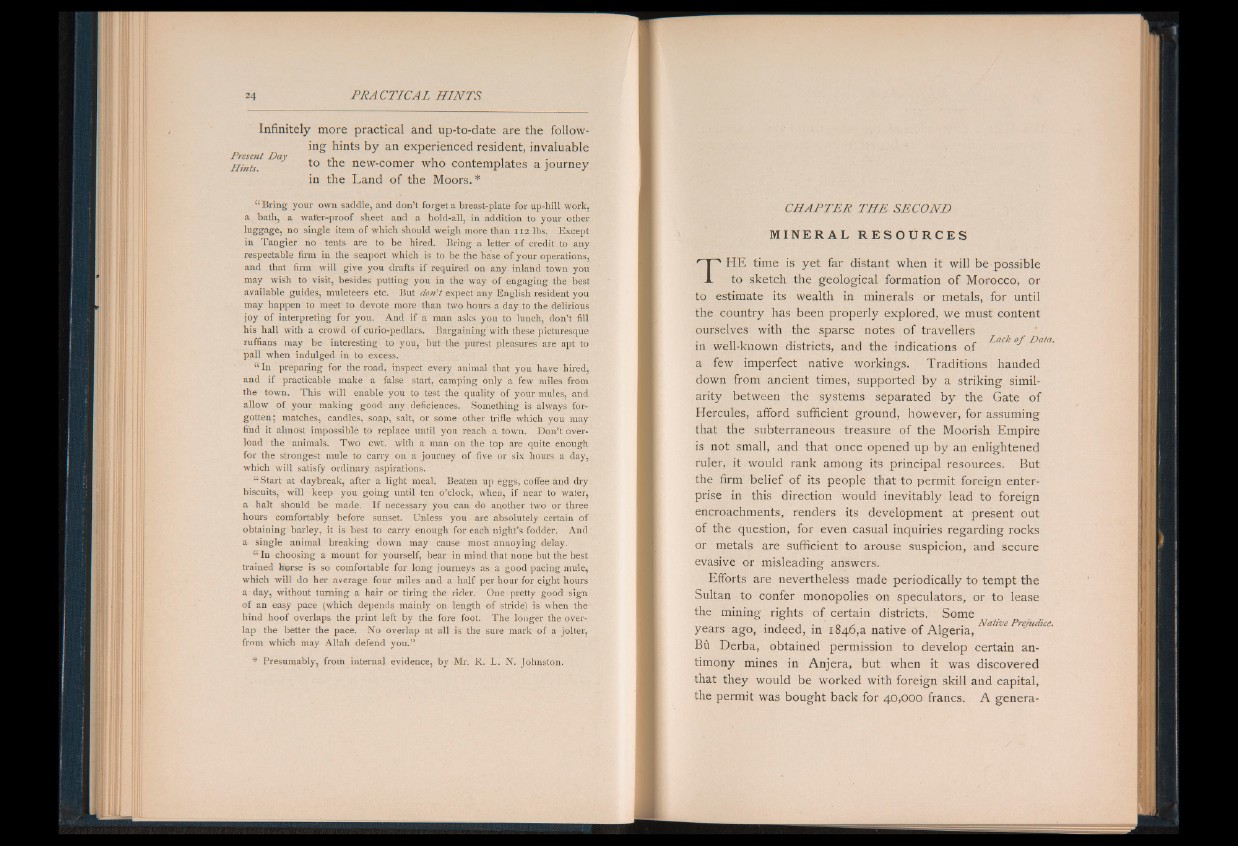
24 PR A C T ICA L H IN T S
Infinitely more practical and up-to-date are the following
hints by an experienced resident, invaluable
Hinh. Da} to new-comer who contemplates a journey
in the Land of the Moors.*
“ Bring your own saddle, and don’t forget a breast-plate for up-hill work,
a bath, a wafer-proof sheet and a hold-all, in addition to your other
luggage, no single item of which should weigh more than 112 lbs. Except
in Tangier no tents are to be hired. Bring a letter of credit to any
respectable firm in the seaport which is to be the base of your operations,
and that firm will give you drafts if required on any inland town you
may wish to visit, besides putting you in the way of engaging the best
available guides, muleteers etc. But don't expect any English resident you
may happen to meet to devote more than two hours a day to the delirious
joy of interpreting for you. And if a man asks you to lunch, don’t fill
his hall with a crowd of curio-pedlars. Bargaining with these picturesque
ruffians may be interesting to you, but the purest pleasures are apt to
pall when indulged in to excess.
“ In preparing for the road, inspect every animal that you have hired,
and if practicable make a false start, camping only a few miles from
the town. This will enable you to test the quality of your mules, and
allow of your making good any deficiences. Something is always forgotten;
matches, candles, soap, salt, or some other trifle which you may
find it almost impossible to replace until you reach a town. Don’t overload
the animals. Two cwt. with a man on the top are quite enough
for the strongest mule to carry on a journey of five or six hours a day,
which will satisfy ordinary aspirations.
“ Start at daybreak, after a light meal. Beaten up eggs, coffee and dry
biscuits, will keep you going until ten o’clock, when, if near to water,
a halt should be made. If necessary you can do another two or three
hours comfortably before sunset. Unless you are absolutely certain of
obtaining barley, it is best to carry enough for each night’s fodder. And
a single animal breaking down may cause most annoying delay.
“ In choosing a mount for yourself, bear in mind that none but the best
trained horse is so comfortable for long journeys as a good pacing mule,
which will do her average four miles and a half per hour for eight hours
a day, without turning a hair or tiring the rider. One pretty good sign
of an easy pace (which depends mainly on length of stride) is when the
hind hoof overlaps the print left by the fore foot. The longer the overlap
the better the pace. No overlap at all is the sure mark of a jolrer,
from which may Allah defend you.”
* Presumably, from internal evidence, by Mr. R. L. N. Johnston.
CH APTER TH E SECOND
MINERA L R E S O U R C E S
'"T~' HE time is yet far distant when it will be possible
X to sketch the geological formation of Morocco, or
to estimate its wealth in minerals or metals, for until
the country has been properly explored, we must content
ourselves with the sparse notes of travellers
in well-known districts, and the indications o f ** Data"
a few imperfect native workings. Traditions handed
down from ancient times, supported by a striking similarity
between the systems separated by the Gate of
Hercules, afford sufficient ground, howevqr, for assuming
that the subterraneous treasure of the Moorish Empire
is not small, and that once opened up by an enlightened
ruler, it would rank among its principal resources. But
the firm belief of its people that to permit foreign enterprise
in this direction would inevitably lead to foreign
encroachments, renders its development at present out
of the question, for even casual inquiries regarding rocks
or metals are sufficient to arouse suspicion, and secure
evasive or misleading answers.
Efforts are nevertheless made periodically to tempt the
Sultan to confer monopolies on speculators, or to lease
the mining rights of certain districts. Some
years ago, indeed, in 1846,a native o f Algeria, Nahve Prej udue-
Bu Derba, obtained permission to develop certain antimony
mines in Anjera, but when it was discovered
that they would be worked with foreign skill and capital,
the permit was bought back for 40,000 francs. A genera